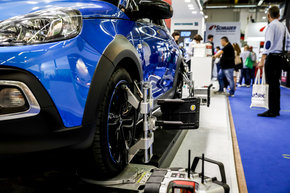
“Officina 4.0” at Autopromotec; the after-sales world questioning its future
Editorial Staff
The aftermarket industry is evolving and to keep pace with the changes taking place in the automotive world, component makers, spare parts dealers and distributors are all focusing on technological innovation. Yet, teamwork is essential if the fourth industrial revolution is to be governed successfully. According to Mauro Severi, President of AICA “Innovation is a mutual effort. This is why we are in the running to become, with Germany, the only true 4.0 factory in Europe”
“Smart” workshops for smarter vehicles. Autopromotec 2017 was the perfect backdrop for the future of the sector. Among predictive diagnostics systems, augmented reality in new advanced working methods and robots, the industry’s operators had the opportunity to take a close look at what and how things will change in the workplace. Impressions from those who visited the “Officina 4.0” were rather different: some considered sensors, state-of-the-art software and tools as a new business opportunity, while others dismissed them as everyday working tools, others still remained skeptical on the future of these technologies. Nevertheless, according to analysts and industry experts, technological innovation and training are the only path towards remaining competitive in the car repair industry.
All elements that according to Aica’s President (Italian Garage Equipment Manufacturers Association) Mauro Severi are more widespread than ever before thanks to a greater system-based knowledge. “ Nowadays, companies are able to understand the great transformations, trends and innovations ushered in by the fourth industrial revolution - were his first remarks during the convention’s opening meeting -. But even more importantly, innovations can no longer be viewed as the result of a single company’s efforts, but the product of systemic actions. Connected cars, driver assistance systems and predictive diagnostics are, in fact, the result of an unprecedented interdisciplinary commitment”. A commitment that in the long term will translate in a healthy market growth. And here is precisely where Italy can and must play a leading role with its 2000 manufacturers of components which produced a 38.8 billion euro turnover in 2015, according to Anfia data, employing 136 thousand direct employees with an export value of 19.9 billion euro. Not to mention the car maintenance sector, with 29.5 billion euro spent in 2016, a 3.9% increase. "The role of garage equipment will become increasingly important and Italy holds the world leadership, with exports that in 2015 alone, exceeded 2.1 billion euro – says Severi - a result made possible by innovative products and the business skills of many small companies that, along with a few "pocket-size multinationals", represent the Made in Italy’s heart". This, according to Severi, is the evident demonstration that "it is not only possible to produce in Italy, but it is also essential. This would kick-start the country’s economic engine again after being jammed for far too long, becoming, together with Germany, the only true factory 4.0 in Europe” concluded Severi.
An idea shared by many, the implementation of which has been entrusted to the ability of the sector’s companies to invest their resources in research, development and professionalism. Hence, cutting-edge equipment, staff training, and new factory and workshop skills are the necessary development boosters needed to revamp the economic recovery. It is no coincidence that the automotive sector ranks as the first private investor in Italy, with € 3 billion a year dedicated to research and development. According to Paolo Vasone, Head of Aftermarket at ANFIA, detecting the changes taking place is essential to remain competitive in the market. "We must never grow weary of being Italians," he says. "Here we have companies that export 85% of their turnover, and represent the healthy backbone of our economy and deserve greater recognition".
A pivotal role in this evolution, rather than a revolution, will be played by the development of the internet of things as well as artificial intelligence. Eugenio Razelli, a highly experienced industrial advisor, besides illustrating a project called "Officina 4.0: Proof of Concept", mentioned a number of studies according to which by 2025, all new vehicles will be connected. A digitally connected world in which the Internet will progressively overwhelm the automotive sector: according to Google in Italy, France, Germany, Spain and Britain, 709 million monthly searches on the Internet revolve around spare parts and accessories while 94 million searches relate to repair and maintenance services, 183 million relate to tires and 3 million to oil. “Fundamental in this regard is the fact that cars and workshops must be connected - emphasizes Razelli – yet Italy still lacks an open protocol linking the various elements of the workshop, I believe something like the Mctcnet 2 platform that could be developed in order to fill this gap".
Experiences from the operators
Not just numbers and forecasts though, during the conference there was room also for some positive experiences as well. Companies that have been able to leverage their know-how to produce increasingly efficient and advanced products.
For example, Franco Fenoglio, president of Scania Italia, was entrusted with the task of presenting some of the innovations through which his company is facing the changing scenarios. One example is the world’s first electric road in Sweden, where Scania vehicles are electrically driven like trolleybuses: an experiment that could soon be repeated in Germany. Not to mention platooning experiments at the port of Singapore, where in a convoy of cargo vehicles only the first has a driver, followed by a number of autonomously driven trucks. Furthermore, Scania can already boast 250,000 vehicles connected through on-board control units. "Connectivity can facilitate waste reduction maximizing, at the same time, real-time vehicle data - continues Fenoglio – thus making it possible to establish tailor-made agreements and contracts".
Pietro Berardi, after sales president of Nissan USA, took the lead in explaining the main international trends, with a special focus on the American market, currently experiencing a real digital obsession". He reminded the audience of the Hyundai-Amazon project, whereby a car can be purchased after a 7-day test, as well as the Carvana scheme, in which a used car is bought and received without having to go through a dealer. "Nowadays, 6 out of 10 people who decide to buy something will do so online – continues Berardi - and this revolution is also affecting the aftermarket. Just think of Amazon’s deal with major manufacturers which allows motorists in large US cities to choose from over 2 million spare parts at a 20% lower price compared to traditional retailers". Nissan too is trying to adapt to these new trends, and for this reason has recently created a Paris-based startup with 30 people working on digitization, but this path, as emphasized by Berardi, can be followed also by smaller companies, as evidenced by a Varese-based workshop that is already using a digital platform to manage online and through smartphones all spare parts services and activities. Will small retailers survive this revolution? "These trends can help even smaller operators in expanding their business, providing they understand and adapt to these trends”, continues Berardi, “bearing in mind that neither small or large operators such as Nissan can stop the future".
All elements that according to Aica’s President (Italian Garage Equipment Manufacturers Association) Mauro Severi are more widespread than ever before thanks to a greater system-based knowledge. “ Nowadays, companies are able to understand the great transformations, trends and innovations ushered in by the fourth industrial revolution - were his first remarks during the convention’s opening meeting -. But even more importantly, innovations can no longer be viewed as the result of a single company’s efforts, but the product of systemic actions. Connected cars, driver assistance systems and predictive diagnostics are, in fact, the result of an unprecedented interdisciplinary commitment”. A commitment that in the long term will translate in a healthy market growth. And here is precisely where Italy can and must play a leading role with its 2000 manufacturers of components which produced a 38.8 billion euro turnover in 2015, according to Anfia data, employing 136 thousand direct employees with an export value of 19.9 billion euro. Not to mention the car maintenance sector, with 29.5 billion euro spent in 2016, a 3.9% increase. "The role of garage equipment will become increasingly important and Italy holds the world leadership, with exports that in 2015 alone, exceeded 2.1 billion euro – says Severi - a result made possible by innovative products and the business skills of many small companies that, along with a few "pocket-size multinationals", represent the Made in Italy’s heart". This, according to Severi, is the evident demonstration that "it is not only possible to produce in Italy, but it is also essential. This would kick-start the country’s economic engine again after being jammed for far too long, becoming, together with Germany, the only true factory 4.0 in Europe” concluded Severi.
An idea shared by many, the implementation of which has been entrusted to the ability of the sector’s companies to invest their resources in research, development and professionalism. Hence, cutting-edge equipment, staff training, and new factory and workshop skills are the necessary development boosters needed to revamp the economic recovery. It is no coincidence that the automotive sector ranks as the first private investor in Italy, with € 3 billion a year dedicated to research and development. According to Paolo Vasone, Head of Aftermarket at ANFIA, detecting the changes taking place is essential to remain competitive in the market. "We must never grow weary of being Italians," he says. "Here we have companies that export 85% of their turnover, and represent the healthy backbone of our economy and deserve greater recognition".
A pivotal role in this evolution, rather than a revolution, will be played by the development of the internet of things as well as artificial intelligence. Eugenio Razelli, a highly experienced industrial advisor, besides illustrating a project called "Officina 4.0: Proof of Concept", mentioned a number of studies according to which by 2025, all new vehicles will be connected. A digitally connected world in which the Internet will progressively overwhelm the automotive sector: according to Google in Italy, France, Germany, Spain and Britain, 709 million monthly searches on the Internet revolve around spare parts and accessories while 94 million searches relate to repair and maintenance services, 183 million relate to tires and 3 million to oil. “Fundamental in this regard is the fact that cars and workshops must be connected - emphasizes Razelli – yet Italy still lacks an open protocol linking the various elements of the workshop, I believe something like the Mctcnet 2 platform that could be developed in order to fill this gap".
Experiences from the operators
Not just numbers and forecasts though, during the conference there was room also for some positive experiences as well. Companies that have been able to leverage their know-how to produce increasingly efficient and advanced products.
For example, Franco Fenoglio, president of Scania Italia, was entrusted with the task of presenting some of the innovations through which his company is facing the changing scenarios. One example is the world’s first electric road in Sweden, where Scania vehicles are electrically driven like trolleybuses: an experiment that could soon be repeated in Germany. Not to mention platooning experiments at the port of Singapore, where in a convoy of cargo vehicles only the first has a driver, followed by a number of autonomously driven trucks. Furthermore, Scania can already boast 250,000 vehicles connected through on-board control units. "Connectivity can facilitate waste reduction maximizing, at the same time, real-time vehicle data - continues Fenoglio – thus making it possible to establish tailor-made agreements and contracts".
Pietro Berardi, after sales president of Nissan USA, took the lead in explaining the main international trends, with a special focus on the American market, currently experiencing a real digital obsession". He reminded the audience of the Hyundai-Amazon project, whereby a car can be purchased after a 7-day test, as well as the Carvana scheme, in which a used car is bought and received without having to go through a dealer. "Nowadays, 6 out of 10 people who decide to buy something will do so online – continues Berardi - and this revolution is also affecting the aftermarket. Just think of Amazon’s deal with major manufacturers which allows motorists in large US cities to choose from over 2 million spare parts at a 20% lower price compared to traditional retailers". Nissan too is trying to adapt to these new trends, and for this reason has recently created a Paris-based startup with 30 people working on digitization, but this path, as emphasized by Berardi, can be followed also by smaller companies, as evidenced by a Varese-based workshop that is already using a digital platform to manage online and through smartphones all spare parts services and activities. Will small retailers survive this revolution? "These trends can help even smaller operators in expanding their business, providing they understand and adapt to these trends”, continues Berardi, “bearing in mind that neither small or large operators such as Nissan can stop the future".
























